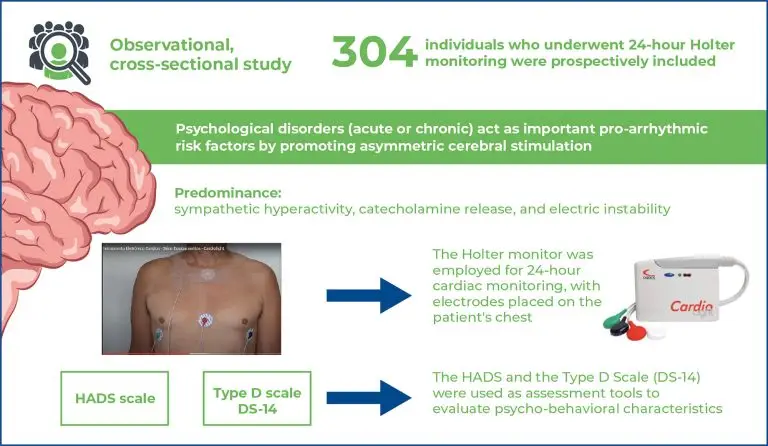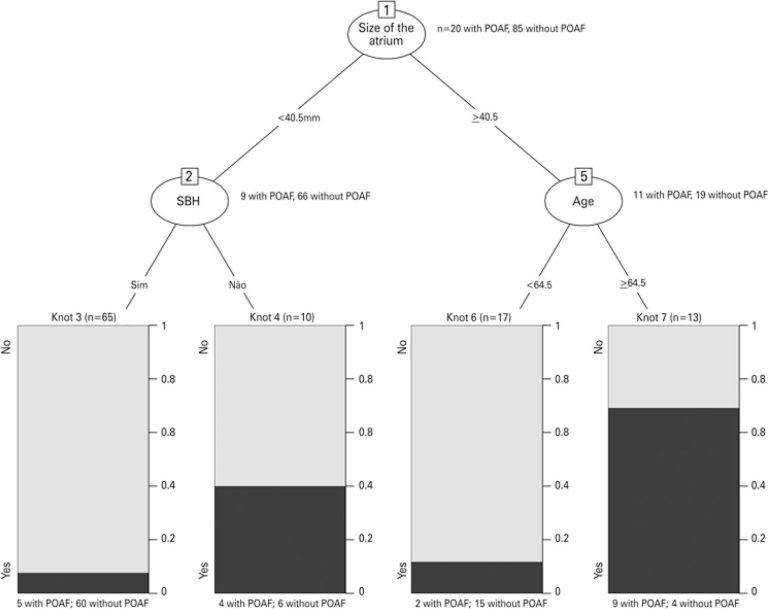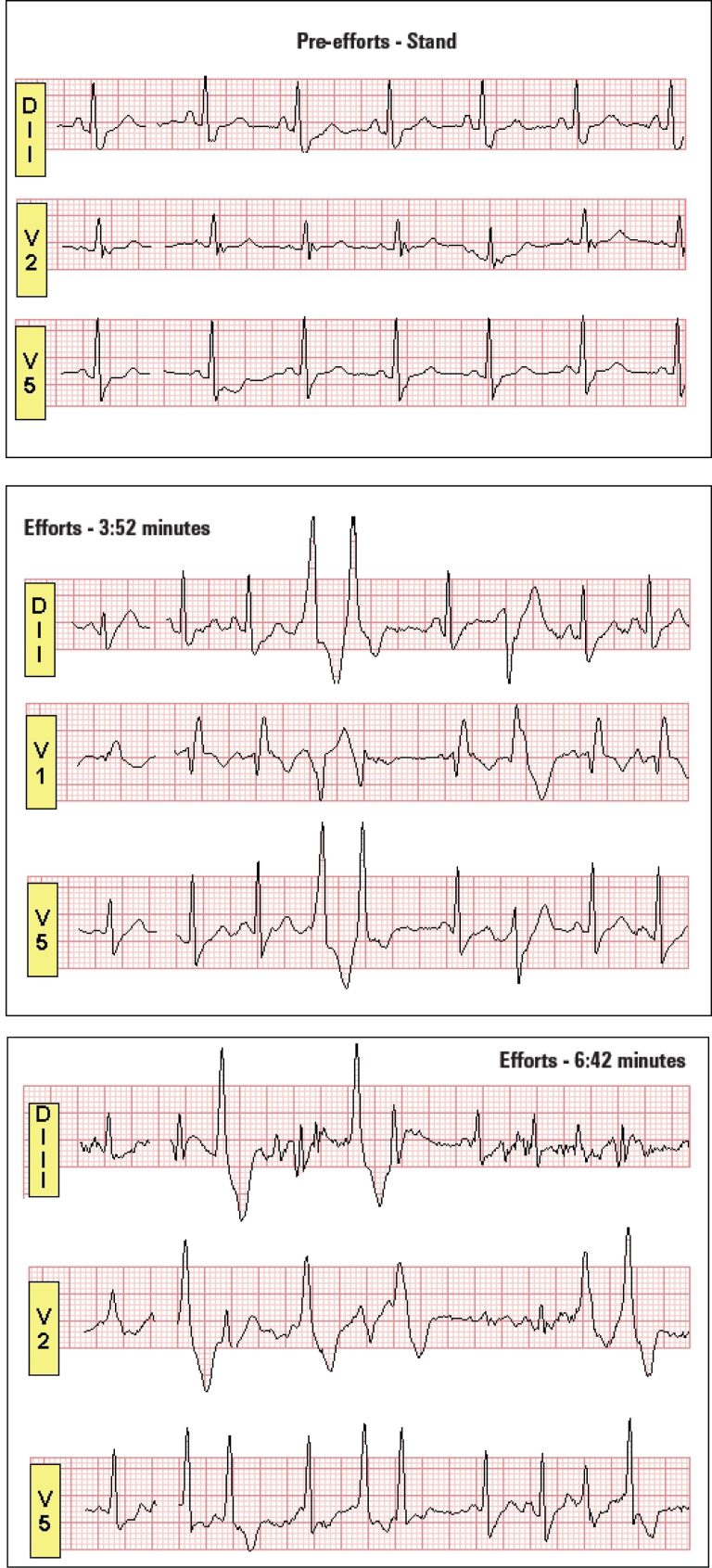14/Mar/2025
Is self-perception of cardiac symptoms related to the psychological profile of patients? A cross-sectional study of individuals undergoing 24-hour Holter monitoring
einstein (São Paulo). 14/Mar/2025;23:eAO0742.
View Article14/Mar/2025
Is self-perception of cardiac symptoms related to the psychological profile of patients? A cross-sectional study of individuals undergoing 24-hour Holter monitoring
DOI: 10.31744/einstein_journal/2025AO0742
Highlights ■ Self-reported cardiac symptoms not associated with arrhythmias. ■ High prevalence of anxiety and depression symptoms. ■ Anxiety was correlated with self-reported cardiac symptoms. ABSTRACT Objective: This study aimed to examine the presence of psychological characteristics and their association with self-reported cardiac symptoms in individuals undergoing 24- hour Holter monitoring. Methods: This observational cross-sectional study included 304 individuals who consecutively underwent 24-hour Holter monitoring. Clinical, demographic, and electrocardiographic data were collected. Psycho-behavioral characteristics were assessed using the Hospital Anxiety […]
Keywords: Anxiety; Arrhythmias, Cardiac; Electrocardiography; Electrocardiography, ambulatory; Heart diseases; Holtermonitoring; Mental Health; Monitoring, physiologic
01/Oct/2016
Predictive factors of atrial fibrillation after coronary artery bypass grafting
DOI: 10.1590/S1679-45082016AO3673
ABSTRACT Objective To analyze predictive demographic and perioperative variables of postoperative atrial fibrillation in patients who underwent exclusively coronary artery bypass grafting. Methods This was a retrospective cohort. We randomly selected 105 medical records of patients who underwent exclusively coronary artery bypass grafting in 2014. Demographic, clinical (preoperative and immediate postoperative) data and related with surgical procedure were collected from medical records. The occurrence of postoperative atrial fibrillation was considered until the third day after the surgery. Variables were analyzed […]
Keywords: Arrhythmias, Cardiac; Atrial fibrillation; Cardiac surgical procedures; Cardiovascular nursing; Critical care; Myocardial revascularization
15/Oct/2013
Electrophysiological characteristics of Chagas disease
DOI: 10.1590/S1679-45082013000300006
OBJECTIVE: Chagas disease has become a global problem due to changing migration patterns. An electrophysiological study is generally indicated for assessing sinus node function, conduction through the atrioventricular node and His-Purkinje system, in addition to evaluating the mechanisms of arrhythmia. The aim of this study was to describe the characteristics of electrophysiological study findings in patients with Chagas disease. METHODS: A retrospective descriptive study of 115 consecutive patients with Chagas disease undergoing an electrophysiological study over the last three years […]
Keywords: Arrhythmias, Cardiac; Cardiac electrophysiology; Chagas disease; Electrocardiography; Stroke volume
01/Jan/2010
Exercise-induced ventricular arrhythmias: analysis of predictive factors in a population with sleep disorders
einstein (São Paulo). 01/Jan/2010;8(1):62-7.
View Article01/Jan/2010
Exercise-induced ventricular arrhythmias: analysis of predictive factors in a population with sleep disorders
DOI: 10.1590/S1679-45082010AO1469
ABSTRACT Objective: To assess the prevalence of ventricular arrhythmias induced by exercise in a population with sleep disorders and to analyze the triggering factors. Methods: Patients were consecutively selected from the database of the Sleep Clinic of Universidade Federal de São Paulo. All subjects were submitted to basal polysomnography, blood sample collection, physical examination, 12-lead ECG, spirometry, cardiorespiratory exercise study on a treadmill, and echocardiogram. The Control Group was matched for age and gender. Results: A total of 312 patients […]
Keywords: Anoxia; Arrhythmias, Cardiac; Arrhythmias, cardiac/epidemiology; Arrhythmias, cardiac/etiology; Causality; Echocardiography, stress; Exercise test; Polysomnography; Sleep apnea syndromes; Sleep disorders; Sleep disorders/epidemiology




